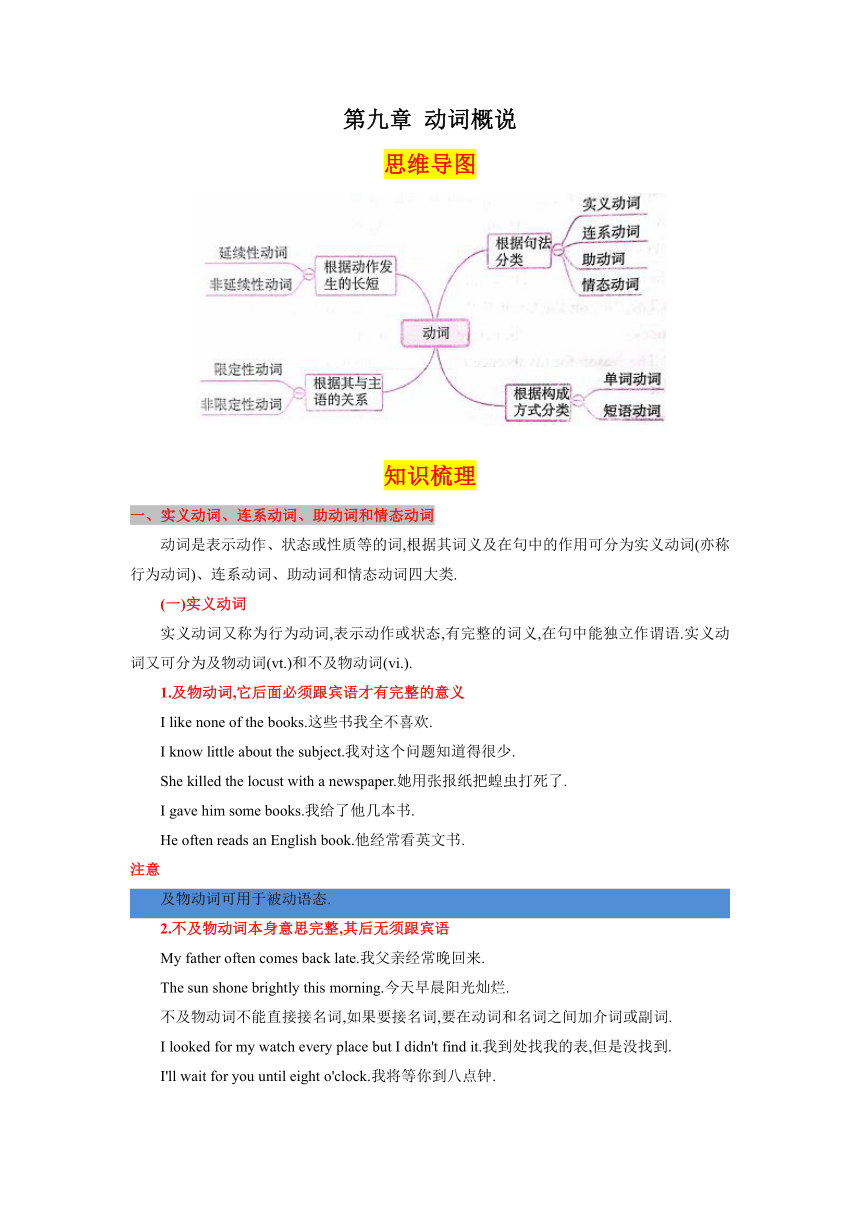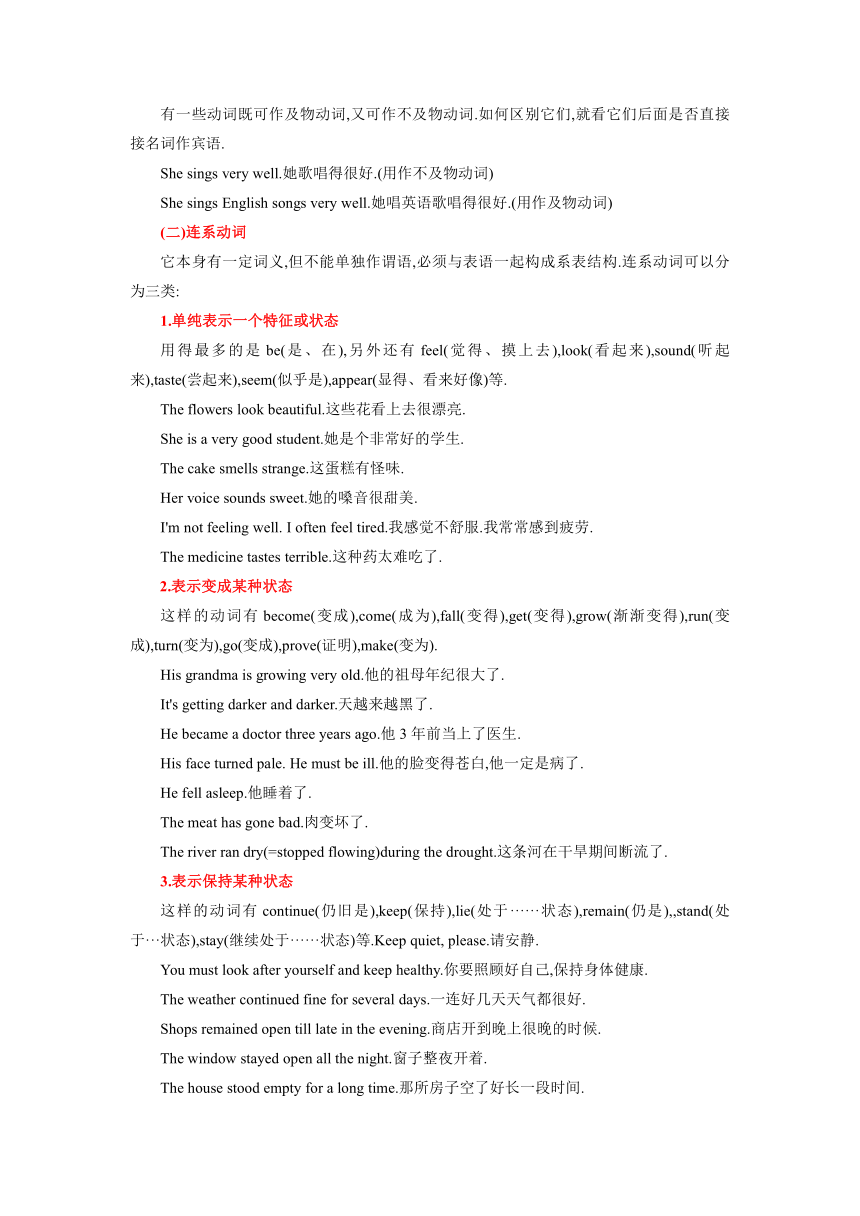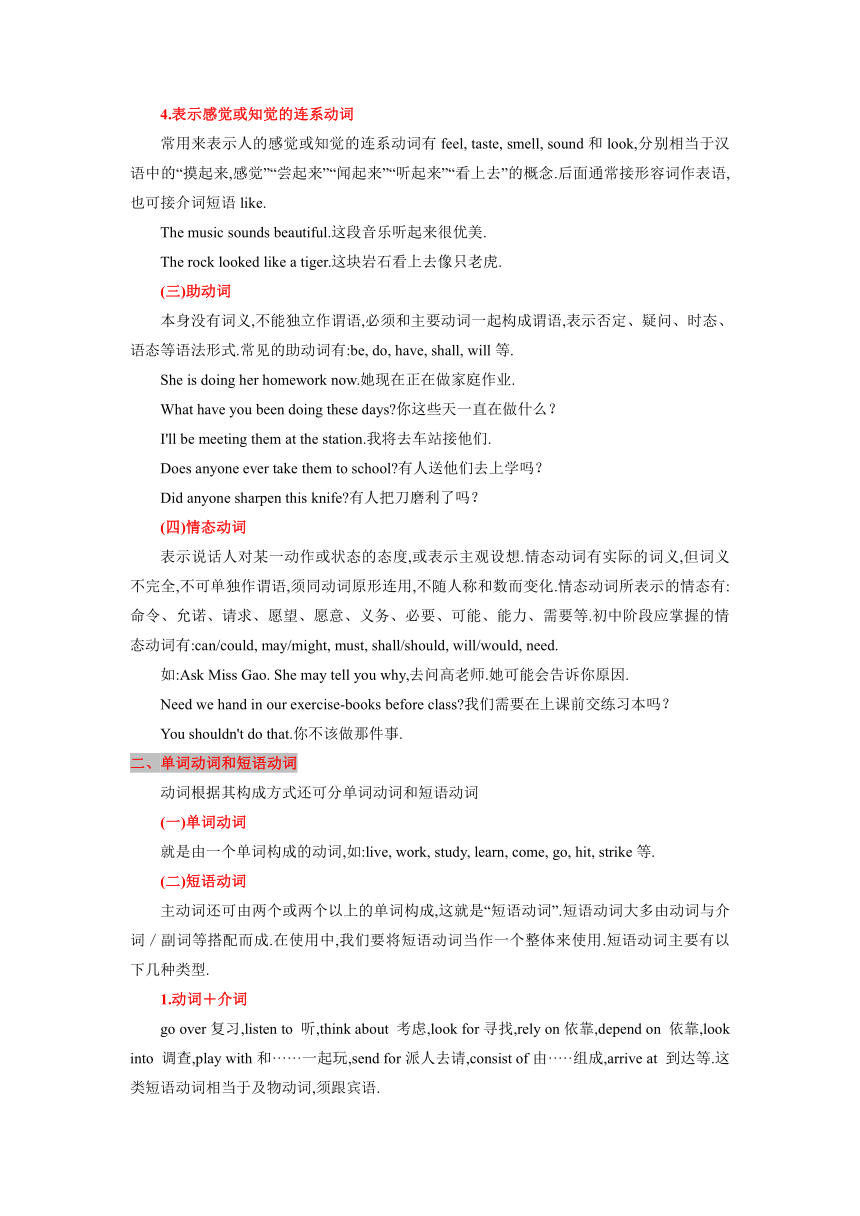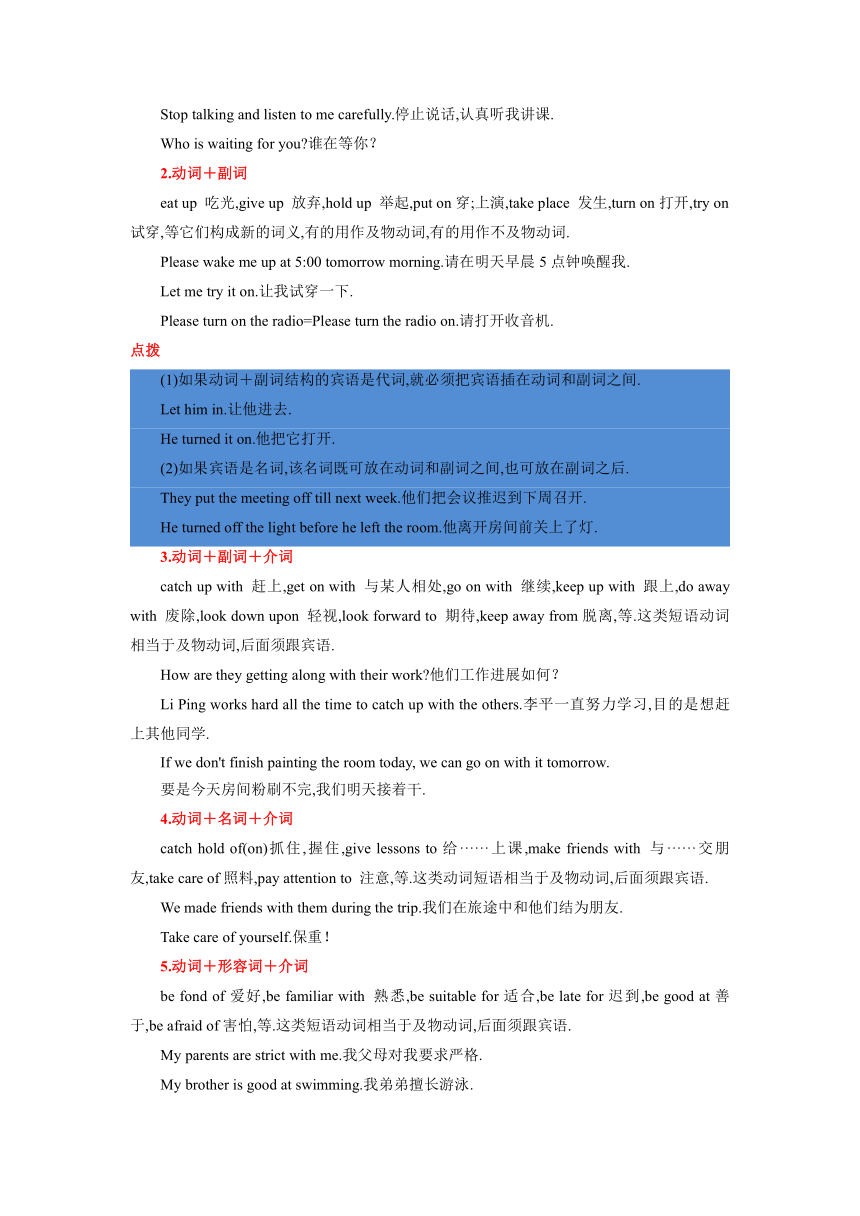第九章动词概说(思维导图+知识梳理+好题精炼)2022-2023初中英语中考语法归纳
文档属性
| 名称 | 第九章动词概说(思维导图+知识梳理+好题精炼)2022-2023初中英语中考语法归纳 |

|
|
| 格式 | docx | ||
| 文件大小 | 151.7KB | ||
| 资源类型 | 教案 | ||
| 版本资源 | 通用版 | ||
| 科目 | 英语 | ||
| 更新时间 | 2023-04-04 06:56:30 | ||
图片预览




文档简介
第九章 动词概说
思维导图
知识梳理
一、实义动词、连系动词、助动词和情态动词
动词是表示动作、状态或性质等的词,根据其词义及在句中的作用可分为实义动词(亦称行为动词)、连系动词、助动词和情态动词四大类.
(一)实义动词
实义动词又称为行为动词,表示动作或状态,有完整的词义,在句中能独立作谓语.实义动词又可分为及物动词(vt.)和不及物动词(vi.).
1.及物动词,它后面必须跟宾语才有完整的意义
I like none of the books.这些书我全不喜欢.
I know little about the subject.我对这个问题知道得很少.
She killed the locust with a newspaper.她用张报纸把蝗虫打死了.
I gave him some books.我给了他几本书.
He often reads an English book.他经常看英文书.
注意
及物动词可用于被动语态.
2.不及物动词本身意思完整,其后无须跟宾语
My father often comes back late.我父亲经常晚回来.
The sun shone brightly this morning.今天早晨阳光灿烂.
不及物动词不能直接接名词,如果要接名词,要在动词和名词之间加介词或副词.
I looked for my watch every place but I didn't find it.我到处找我的表,但是没找到.
I'll wait for you until eight o'clock.我将等你到八点钟.
有一些动词既可作及物动词,又可作不及物动词.如何区别它们,就看它们后面是否直接接名词作宾语.
She sings very well.她歌唱得很好.(用作不及物动词)
She sings English songs very well.她唱英语歌唱得很好.(用作及物动词)
(二)连系动词
它本身有一定词义,但不能单独作谓语,必须与表语一起构成系表结构.连系动词可以分为三类:
1.单纯表示一个特征或状态
用得最多的是be(是、在),另外还有feel(觉得、摸上去),look(看起来),sound(听起来),taste(尝起来),seem(似乎是),appear(显得、看来好像)等.
The flowers look beautiful.这些花看上去很漂亮.
She is a very good student.她是个非常好的学生.
The cake smells strange.这蛋糕有怪味.
Her voice sounds sweet.她的嗓音很甜美.
I'm not feeling well. I often feel tired.我感觉不舒服.我常常感到疲劳.
The medicine tastes terrible.这种药太难吃了.
2.表示变成某种状态
这样的动词有become(变成),come(成为),fall(变得),get(变得),grow(渐渐变得),run(变成),turn(变为),go(变成),prove(证明),make(变为).
His grandma is growing very old.他的祖母年纪很大了.
It's getting darker and darker.天越来越黑了.
He became a doctor three years ago.他3年前当上了医生.
His face turned pale. He must be ill.他的脸变得苍白,他一定是病了.
He fell asleep.他睡着了.
The meat has gone bad.肉变坏了.
The river ran dry(=stopped flowing)during the drought.这条河在干旱期间断流了.
3.表示保持某种状态
这样的动词有continue(仍旧是),keep(保持),lie(处于······状态),remain(仍是),,stand(处于···状态),stay(继续处于······状态)等.Keep quiet, please.请安静.
You must look after yourself and keep healthy.你要照顾好自己,保持身体健康.
The weather continued fine for several days.一连好几天天气都很好.
Shops remained open till late in the evening.商店开到晚上很晚的时候.
The window stayed open all the night.窗子整夜开着.
The house stood empty for a long time.那所房子空了好长一段时间.
4.表示感觉或知觉的连系动词
常用来表示人的感觉或知觉的连系动词有feel, taste, smell, sound和look,分别相当于汉语中的“摸起来,感觉”“尝起来”“闻起来”“听起来”“看上去”的概念.后面通常接形容词作表语,也可接介词短语like.
The music sounds beautiful.这段音乐听起来很优美.
The rock looked like a tiger.这块岩石看上去像只老虎.
(三)助动词
本身没有词义,不能独立作谓语,必须和主要动词一起构成谓语,表示否定、疑问、时态、语态等语法形式.常见的助动词有:be, do, have, shall, will等.
She is doing her homework now.她现在正在做家庭作业.
What have you been doing these days 你这些天一直在做什么?
I'll be meeting them at the station.我将去车站接他们.
Does anyone ever take them to school 有人送他们去上学吗?
Did anyone sharpen this knife 有人把刀磨利了吗?
(四)情态动词
表示说话人对某一动作或状态的态度,或表示主观设想.情态动词有实际的词义,但词义不完全,不可单独作谓语,须同动词原形连用,不随人称和数而变化.情态动词所表示的情态有:命令、允诺、请求、愿望、愿意、义务、必要、可能、能力、需要等.初中阶段应掌握的情态动词有:can/could, may/might, must, shall/should, will/would, need.
如:Ask Miss Gao. She may tell you why,去问高老师.她可能会告诉你原因.
Need we hand in our exercise-books before class 我们需要在上课前交练习本吗?
You shouldn't do that.你不该做那件事.
二、单词动词和短语动词
动词根据其构成方式还可分单词动词和短语动词
(一)单词动词
就是由一个单词构成的动词,如:live, work, study, learn, come, go, hit, strike等.
(二)短语动词
主动词还可由两个或两个以上的单词构成,这就是“短语动词”.短语动词大多由动词与介词/副词等搭配而成.在使用中,我们要将短语动词当作一个整体来使用.短语动词主要有以下几种类型.
1.动词+介词
go over复习,listen to 听,think about 考虑,look for寻找,rely on依靠,depend on 依靠,look into 调查,play with和······一起玩,send for派人去请,consist of由·····组成,arrive at 到达等.这类短语动词相当于及物动词,须跟宾语.
Stop talking and listen to me carefully.停止说话,认真听我讲课.
Who is waiting for you 谁在等你?
2.动词+副词
eat up 吃光,give up 放弃,hold up 举起,put on穿;上演,take place 发生,turn on打开,try on试穿,等它们构成新的词义,有的用作及物动词,有的用作不及物动词.
Please wake me up at 5:00 tomorrow morning.请在明天早晨5点钟唤醒我.
Let me try it on.让我试穿一下.
Please turn on the radio=Please turn the radio on.请打开收音机.
点拨
(1)如果动词+副词结构的宾语是代词,就必须把宾语插在动词和副词之间.
Let him in.让他进去.
He turned it on.他把它打开.
(2)如果宾语是名词,该名词既可放在动词和副词之间,也可放在副词之后.
They put the meeting off till next week.他们把会议推迟到下周召开.
He turned off the light before he left the room.他离开房间前关上了灯.
3.动词+副词+介词
catch up with 赶上,get on with 与某人相处,go on with 继续,keep up with 跟上,do away with 废除,look down upon 轻视,look forward to 期待,keep away from脱离,等.这类短语动词相当于及物动词,后面须跟宾语.
How are they getting along with their work 他们工作进展如何?
Li Ping works hard all the time to catch up with the others.李平一直努力学习,目的是想赶上其他同学.
If we don't finish painting the room today, we can go on with it tomorrow.
要是今天房间粉刷不完,我们明天接着干.
4.动词+名词+介词
catch hold of(on)抓住,握住,give lessons to给······上课,make friends with 与······交朋友,take care of照料,pay attention to 注意,等.这类动词短语相当于及物动词,后面须跟宾语.
We made friends with them during the trip.我们在旅途中和他们结为朋友.
Take care of yourself.保重!
5.动词+形容词+介词
be fond of爱好,be familiar with 熟悉,be suitable for适合,be late for迟到,be good at善于,be afraid of害怕,等.这类短语动词相当于及物动词,后面须跟宾语.
My parents are strict with me.我父母对我要求严格.
My brother is good at swimming.我弟弟擅长游泳.
I'm looking forward to seeing you.我高兴地期望和你见面.
Are you afraid of snakes 你怕蛇吗?
I'm very fond of dancing.我很喜欢跳舞.
Many people are fond of showing off.有许多人喜欢炫耀.
三、延续性动词和非延续性动词
英语中表示动作的动词,按其动作发生过程的长短,可分为延续性动词和非延续性动词.
(一)延续性动词
又叫持续性动词,它所表示的动作是一种延续的动作,这种动作可以延续下去或产生持久的影响.延续性动词可以与表示一段时间的状语连用,如“for+一段时间”“since+从句(一般过去时)”“since+时间点”,how long等.这样的动词有learn, work, stand, lie, walk, keep, have, wait, smoke, watch, sing, read, sleep, live等.
We have known each other since childhood.自孩提时代我们就认识.
I have been living here for years.我在这里住了多年了.
They've been working from morning to night.他们从早到晚一直在干活儿.
点拨
延续性动词通常(如一般过去时)不可以和一个表示短暂的具体时间状
语连用;若用于进行时态,则可以和表示具体时刻的时间状语连用.
正:The boy was reading at six yesterday afternoon.
正:The boy began to read at six yesterday afternoon.
误:The boy read at six yesterday afternoon.
(二)非延续性动词
这种动词表示的动作不能延续,即动作发生后立即结束,产生某种结果.这样的动词有close, die, arrive, post, come, fall, leave, go, break, lose, give, join, receive, buy, borrow, become, start, happen, begin, finish, kill, marry等.
The boy broke his arm yesterday.这男孩昨天把胳膊弄折了.
He went to Shanghai two weeks ago.两个星期前,他去上海了.
It happened after three years.事情发生于三年后.
如上所述,非延续性动词的肯定式不能与for, since引导的表示一段时间的短语或从句连用.
点拨
(1)用“(一段时间)+ago”代替“for+-段时间”或用“It is+(一段时间)+since”或用“(一段时间)+has passed+ since”.
(2)将非延续性动词(词组)改成be+形容词(副词、名词、介词短语等)或相近的延续性动词.
四、限定性动词和非限定性动词
英语动词还可以根据其与主语的关系分为限定动词和非限定动词.限定动词在句子中起谓语作用,可与助动词或情态动词连用,但必须与主语在人称和数上保持一致.
(一)限定性动词
The coat is much too big for me.这衣服我穿太大了.
They haven't arrived at an agreement.他们尚未达成协议.
He goes to school every day.他每天上学.
They were preparing for the party last week.上周他们正为聚会做准备.
(二)非限定性动词
英语主动词有三种非限定形式,它们是不定式(包括带to的和不带to的不定式),-ing分词和-ed分词,它们在句中不起谓语作用,而可以起主语、宾语、补语、状语、定语等作用.它们不受主语的人称和数的制约.
I want Bill to come with me.我想要比尔跟我一道去.
I heard him lock the door.我听到他锁门了.
I must get my bike repaired.我必须叫人修一下我的自行车.
Doing this can save a lot of time and money.这样做可以节省很多时间和钱.
I can't help laughing.我忍不住笑了.
好题精练
一、选择填空
1.No one knew why Miss Black_________ the new boxes.
A. has broken
B. had broken
C. would have broken
D. have broken
2.-Where are you_________
-At the Grand Hotel.
A. staying B. living C. remaining D. stopping
3.Don't keep on_________ the book.
A. finding B. seeing C. borrowing D. reading
4.What a fine day, _________.
A. what are they B. won't it C. isn't it D. No, it isn't
5.The stranger told us his name after we_________ him twice.
A. asked B. have asked C. were asking D. had asked
6.Today is Saturday. Tomorrow_________ Sunday.
A. is going to B. will C. will be D. is going to be
7.Don't worry, the train_________ yet.
A. arrived B. won't arrive C. has arrived D. hasn't arrived
8.Tim_________ the army for three years.
A. has joined B. has taken part in C. has attented D. has been in
9.I believe she'll always keep what you_________ her.
A. have just given B. just gave C. won't give D. had given
10.One morning while I_________ along the street, I_________ an old man crying.
A. walking; heard B. walked; heard
C. was walking; was hearing D. was walking; heard
答案:
1-5BADCD 6-10CDDAD
二、改正下列句中的错误
1.The old man is dieing.
____________________________________________________________________________________________
2.They entered into the hall one after another.
____________________________________________________________________________________________
3.Before liberation the Yellow River often overflew its banks.
____________________________________________________________________________________________
4.She married with a rich man at the age of twenty.
____________________________________________________________________________________________
5.The cake tasted well.
____________________________________________________________________________________________
6.What did they discuss about at the meeting
____________________________________________________________________________________________
7.The sun raises in the east.
____________________________________________________________________________________________
8.We ought study hard for the people.
____________________________________________________________________________________________
9.I have put up the map on the wall an hour ago.
____________________________________________________________________________________________
10.Do you agree me on this point
____________________________________________________________________________________________
答案:
1.dieing→dying
2.去掉into
3.overflew→overflowed4.去掉with
5.well→good
6.去掉about
7.raises→rises
8.ought→ought to
9.have put up→ put up
10.agree后加with
思维导图
知识梳理
一、实义动词、连系动词、助动词和情态动词
动词是表示动作、状态或性质等的词,根据其词义及在句中的作用可分为实义动词(亦称行为动词)、连系动词、助动词和情态动词四大类.
(一)实义动词
实义动词又称为行为动词,表示动作或状态,有完整的词义,在句中能独立作谓语.实义动词又可分为及物动词(vt.)和不及物动词(vi.).
1.及物动词,它后面必须跟宾语才有完整的意义
I like none of the books.这些书我全不喜欢.
I know little about the subject.我对这个问题知道得很少.
She killed the locust with a newspaper.她用张报纸把蝗虫打死了.
I gave him some books.我给了他几本书.
He often reads an English book.他经常看英文书.
注意
及物动词可用于被动语态.
2.不及物动词本身意思完整,其后无须跟宾语
My father often comes back late.我父亲经常晚回来.
The sun shone brightly this morning.今天早晨阳光灿烂.
不及物动词不能直接接名词,如果要接名词,要在动词和名词之间加介词或副词.
I looked for my watch every place but I didn't find it.我到处找我的表,但是没找到.
I'll wait for you until eight o'clock.我将等你到八点钟.
有一些动词既可作及物动词,又可作不及物动词.如何区别它们,就看它们后面是否直接接名词作宾语.
She sings very well.她歌唱得很好.(用作不及物动词)
She sings English songs very well.她唱英语歌唱得很好.(用作及物动词)
(二)连系动词
它本身有一定词义,但不能单独作谓语,必须与表语一起构成系表结构.连系动词可以分为三类:
1.单纯表示一个特征或状态
用得最多的是be(是、在),另外还有feel(觉得、摸上去),look(看起来),sound(听起来),taste(尝起来),seem(似乎是),appear(显得、看来好像)等.
The flowers look beautiful.这些花看上去很漂亮.
She is a very good student.她是个非常好的学生.
The cake smells strange.这蛋糕有怪味.
Her voice sounds sweet.她的嗓音很甜美.
I'm not feeling well. I often feel tired.我感觉不舒服.我常常感到疲劳.
The medicine tastes terrible.这种药太难吃了.
2.表示变成某种状态
这样的动词有become(变成),come(成为),fall(变得),get(变得),grow(渐渐变得),run(变成),turn(变为),go(变成),prove(证明),make(变为).
His grandma is growing very old.他的祖母年纪很大了.
It's getting darker and darker.天越来越黑了.
He became a doctor three years ago.他3年前当上了医生.
His face turned pale. He must be ill.他的脸变得苍白,他一定是病了.
He fell asleep.他睡着了.
The meat has gone bad.肉变坏了.
The river ran dry(=stopped flowing)during the drought.这条河在干旱期间断流了.
3.表示保持某种状态
这样的动词有continue(仍旧是),keep(保持),lie(处于······状态),remain(仍是),,stand(处于···状态),stay(继续处于······状态)等.Keep quiet, please.请安静.
You must look after yourself and keep healthy.你要照顾好自己,保持身体健康.
The weather continued fine for several days.一连好几天天气都很好.
Shops remained open till late in the evening.商店开到晚上很晚的时候.
The window stayed open all the night.窗子整夜开着.
The house stood empty for a long time.那所房子空了好长一段时间.
4.表示感觉或知觉的连系动词
常用来表示人的感觉或知觉的连系动词有feel, taste, smell, sound和look,分别相当于汉语中的“摸起来,感觉”“尝起来”“闻起来”“听起来”“看上去”的概念.后面通常接形容词作表语,也可接介词短语like.
The music sounds beautiful.这段音乐听起来很优美.
The rock looked like a tiger.这块岩石看上去像只老虎.
(三)助动词
本身没有词义,不能独立作谓语,必须和主要动词一起构成谓语,表示否定、疑问、时态、语态等语法形式.常见的助动词有:be, do, have, shall, will等.
She is doing her homework now.她现在正在做家庭作业.
What have you been doing these days 你这些天一直在做什么?
I'll be meeting them at the station.我将去车站接他们.
Does anyone ever take them to school 有人送他们去上学吗?
Did anyone sharpen this knife 有人把刀磨利了吗?
(四)情态动词
表示说话人对某一动作或状态的态度,或表示主观设想.情态动词有实际的词义,但词义不完全,不可单独作谓语,须同动词原形连用,不随人称和数而变化.情态动词所表示的情态有:命令、允诺、请求、愿望、愿意、义务、必要、可能、能力、需要等.初中阶段应掌握的情态动词有:can/could, may/might, must, shall/should, will/would, need.
如:Ask Miss Gao. She may tell you why,去问高老师.她可能会告诉你原因.
Need we hand in our exercise-books before class 我们需要在上课前交练习本吗?
You shouldn't do that.你不该做那件事.
二、单词动词和短语动词
动词根据其构成方式还可分单词动词和短语动词
(一)单词动词
就是由一个单词构成的动词,如:live, work, study, learn, come, go, hit, strike等.
(二)短语动词
主动词还可由两个或两个以上的单词构成,这就是“短语动词”.短语动词大多由动词与介词/副词等搭配而成.在使用中,我们要将短语动词当作一个整体来使用.短语动词主要有以下几种类型.
1.动词+介词
go over复习,listen to 听,think about 考虑,look for寻找,rely on依靠,depend on 依靠,look into 调查,play with和······一起玩,send for派人去请,consist of由·····组成,arrive at 到达等.这类短语动词相当于及物动词,须跟宾语.
Stop talking and listen to me carefully.停止说话,认真听我讲课.
Who is waiting for you 谁在等你?
2.动词+副词
eat up 吃光,give up 放弃,hold up 举起,put on穿;上演,take place 发生,turn on打开,try on试穿,等它们构成新的词义,有的用作及物动词,有的用作不及物动词.
Please wake me up at 5:00 tomorrow morning.请在明天早晨5点钟唤醒我.
Let me try it on.让我试穿一下.
Please turn on the radio=Please turn the radio on.请打开收音机.
点拨
(1)如果动词+副词结构的宾语是代词,就必须把宾语插在动词和副词之间.
Let him in.让他进去.
He turned it on.他把它打开.
(2)如果宾语是名词,该名词既可放在动词和副词之间,也可放在副词之后.
They put the meeting off till next week.他们把会议推迟到下周召开.
He turned off the light before he left the room.他离开房间前关上了灯.
3.动词+副词+介词
catch up with 赶上,get on with 与某人相处,go on with 继续,keep up with 跟上,do away with 废除,look down upon 轻视,look forward to 期待,keep away from脱离,等.这类短语动词相当于及物动词,后面须跟宾语.
How are they getting along with their work 他们工作进展如何?
Li Ping works hard all the time to catch up with the others.李平一直努力学习,目的是想赶上其他同学.
If we don't finish painting the room today, we can go on with it tomorrow.
要是今天房间粉刷不完,我们明天接着干.
4.动词+名词+介词
catch hold of(on)抓住,握住,give lessons to给······上课,make friends with 与······交朋友,take care of照料,pay attention to 注意,等.这类动词短语相当于及物动词,后面须跟宾语.
We made friends with them during the trip.我们在旅途中和他们结为朋友.
Take care of yourself.保重!
5.动词+形容词+介词
be fond of爱好,be familiar with 熟悉,be suitable for适合,be late for迟到,be good at善于,be afraid of害怕,等.这类短语动词相当于及物动词,后面须跟宾语.
My parents are strict with me.我父母对我要求严格.
My brother is good at swimming.我弟弟擅长游泳.
I'm looking forward to seeing you.我高兴地期望和你见面.
Are you afraid of snakes 你怕蛇吗?
I'm very fond of dancing.我很喜欢跳舞.
Many people are fond of showing off.有许多人喜欢炫耀.
三、延续性动词和非延续性动词
英语中表示动作的动词,按其动作发生过程的长短,可分为延续性动词和非延续性动词.
(一)延续性动词
又叫持续性动词,它所表示的动作是一种延续的动作,这种动作可以延续下去或产生持久的影响.延续性动词可以与表示一段时间的状语连用,如“for+一段时间”“since+从句(一般过去时)”“since+时间点”,how long等.这样的动词有learn, work, stand, lie, walk, keep, have, wait, smoke, watch, sing, read, sleep, live等.
We have known each other since childhood.自孩提时代我们就认识.
I have been living here for years.我在这里住了多年了.
They've been working from morning to night.他们从早到晚一直在干活儿.
点拨
延续性动词通常(如一般过去时)不可以和一个表示短暂的具体时间状
语连用;若用于进行时态,则可以和表示具体时刻的时间状语连用.
正:The boy was reading at six yesterday afternoon.
正:The boy began to read at six yesterday afternoon.
误:The boy read at six yesterday afternoon.
(二)非延续性动词
这种动词表示的动作不能延续,即动作发生后立即结束,产生某种结果.这样的动词有close, die, arrive, post, come, fall, leave, go, break, lose, give, join, receive, buy, borrow, become, start, happen, begin, finish, kill, marry等.
The boy broke his arm yesterday.这男孩昨天把胳膊弄折了.
He went to Shanghai two weeks ago.两个星期前,他去上海了.
It happened after three years.事情发生于三年后.
如上所述,非延续性动词的肯定式不能与for, since引导的表示一段时间的短语或从句连用.
点拨
(1)用“(一段时间)+ago”代替“for+-段时间”或用“It is+(一段时间)+since”或用“(一段时间)+has passed+ since”.
(2)将非延续性动词(词组)改成be+形容词(副词、名词、介词短语等)或相近的延续性动词.
四、限定性动词和非限定性动词
英语动词还可以根据其与主语的关系分为限定动词和非限定动词.限定动词在句子中起谓语作用,可与助动词或情态动词连用,但必须与主语在人称和数上保持一致.
(一)限定性动词
The coat is much too big for me.这衣服我穿太大了.
They haven't arrived at an agreement.他们尚未达成协议.
He goes to school every day.他每天上学.
They were preparing for the party last week.上周他们正为聚会做准备.
(二)非限定性动词
英语主动词有三种非限定形式,它们是不定式(包括带to的和不带to的不定式),-ing分词和-ed分词,它们在句中不起谓语作用,而可以起主语、宾语、补语、状语、定语等作用.它们不受主语的人称和数的制约.
I want Bill to come with me.我想要比尔跟我一道去.
I heard him lock the door.我听到他锁门了.
I must get my bike repaired.我必须叫人修一下我的自行车.
Doing this can save a lot of time and money.这样做可以节省很多时间和钱.
I can't help laughing.我忍不住笑了.
好题精练
一、选择填空
1.No one knew why Miss Black_________ the new boxes.
A. has broken
B. had broken
C. would have broken
D. have broken
2.-Where are you_________
-At the Grand Hotel.
A. staying B. living C. remaining D. stopping
3.Don't keep on_________ the book.
A. finding B. seeing C. borrowing D. reading
4.What a fine day, _________.
A. what are they B. won't it C. isn't it D. No, it isn't
5.The stranger told us his name after we_________ him twice.
A. asked B. have asked C. were asking D. had asked
6.Today is Saturday. Tomorrow_________ Sunday.
A. is going to B. will C. will be D. is going to be
7.Don't worry, the train_________ yet.
A. arrived B. won't arrive C. has arrived D. hasn't arrived
8.Tim_________ the army for three years.
A. has joined B. has taken part in C. has attented D. has been in
9.I believe she'll always keep what you_________ her.
A. have just given B. just gave C. won't give D. had given
10.One morning while I_________ along the street, I_________ an old man crying.
A. walking; heard B. walked; heard
C. was walking; was hearing D. was walking; heard
答案:
1-5BADCD 6-10CDDAD
二、改正下列句中的错误
1.The old man is dieing.
____________________________________________________________________________________________
2.They entered into the hall one after another.
____________________________________________________________________________________________
3.Before liberation the Yellow River often overflew its banks.
____________________________________________________________________________________________
4.She married with a rich man at the age of twenty.
____________________________________________________________________________________________
5.The cake tasted well.
____________________________________________________________________________________________
6.What did they discuss about at the meeting
____________________________________________________________________________________________
7.The sun raises in the east.
____________________________________________________________________________________________
8.We ought study hard for the people.
____________________________________________________________________________________________
9.I have put up the map on the wall an hour ago.
____________________________________________________________________________________________
10.Do you agree me on this point
____________________________________________________________________________________________
答案:
1.dieing→dying
2.去掉into
3.overflew→overflowed4.去掉with
5.well→good
6.去掉about
7.raises→rises
8.ought→ought to
9.have put up→ put up
10.agree后加with
同课章节目录
- 词法
- 名词
- 动词和动词短语
- 动词语态
- 动词时态
- 助动词和情态动词
- 非谓语动词
- 冠词
- 代词
- 数词和量词
- 形容词副词及其比较等级
- 介词和介词短语
- 连词和感叹词
- 构词法
- 相似、相近词比较
- 句法
- 陈述句
- 一般疑问句和否定疑问句
- 特殊疑问句及选择疑问句
- 反意疑问句
- 存在句(There be句型)
- 宾语从句
- 定语从句
- 状语从句
- 主谓一致问题
- 简单句
- 并列句
- 复合句
- 主谓一致
- 主、表语从句
- 名词性从句
- 直接引语和间接引语
- 虚拟语气
- 感叹句
- 强调句
- 倒装句
- 祈使句
- 句子的成分
- 句子的分类
- 题型专区
- 单项选择部分
- 易错题
- 完形填空
- 阅读理解
- 词汇练习
- 听说训练
- 句型转换
- 补全对话
- 短文改错
- 翻译
- 书面表达
- 任务型阅读
- 语法填空
- 其他资料
